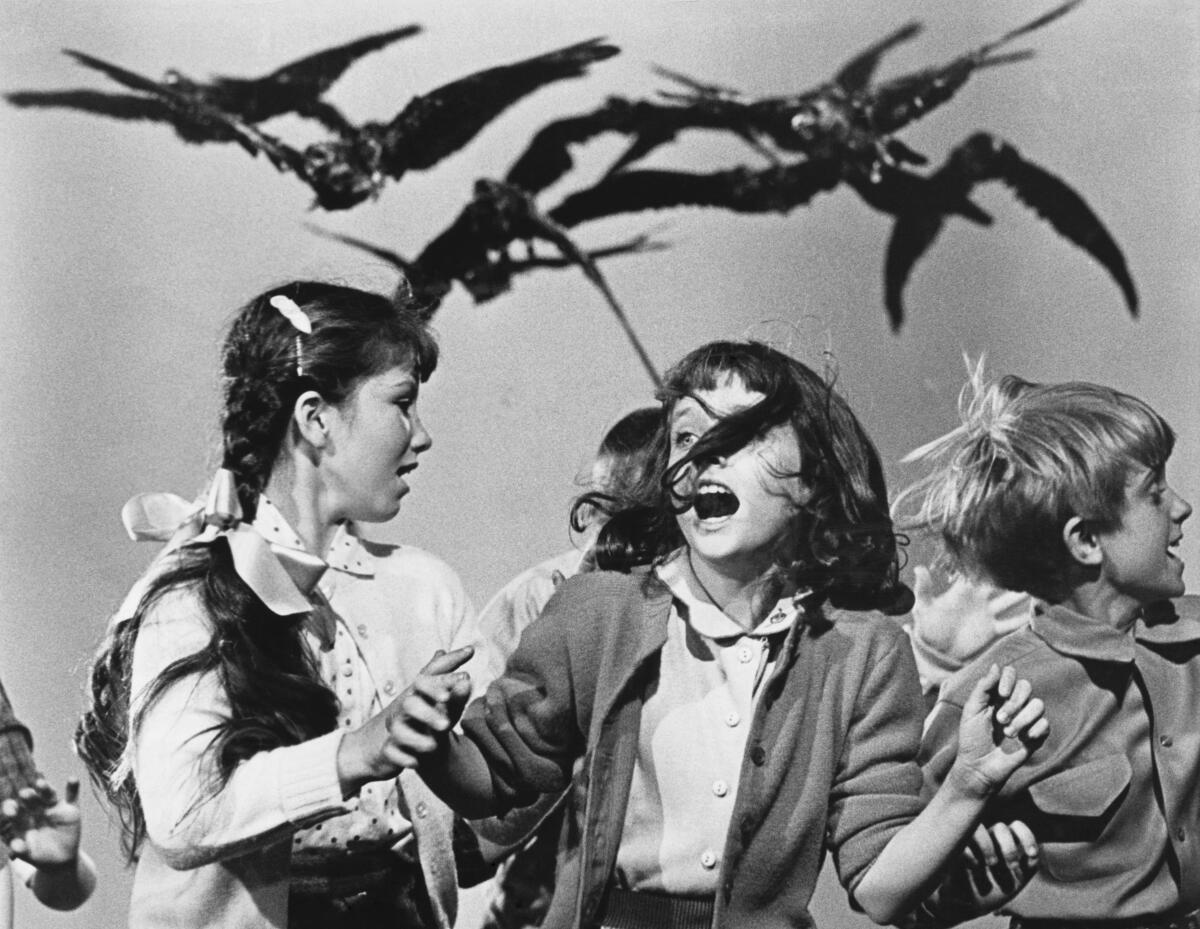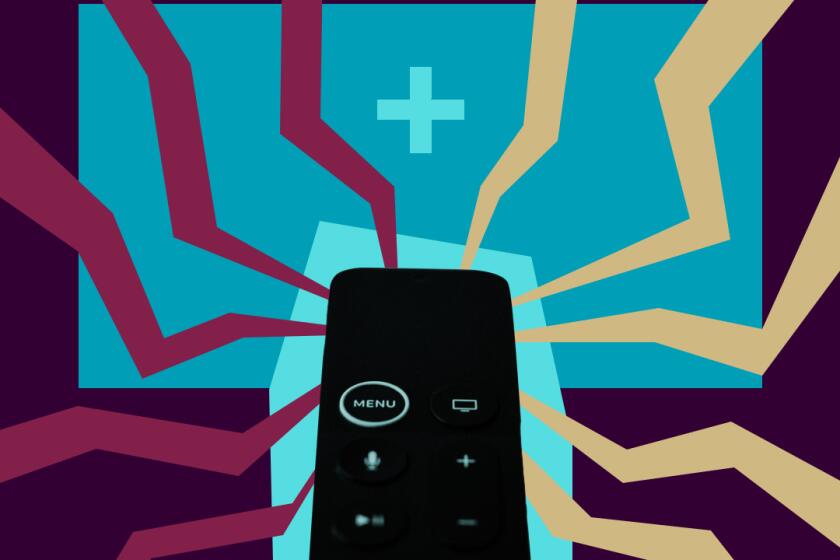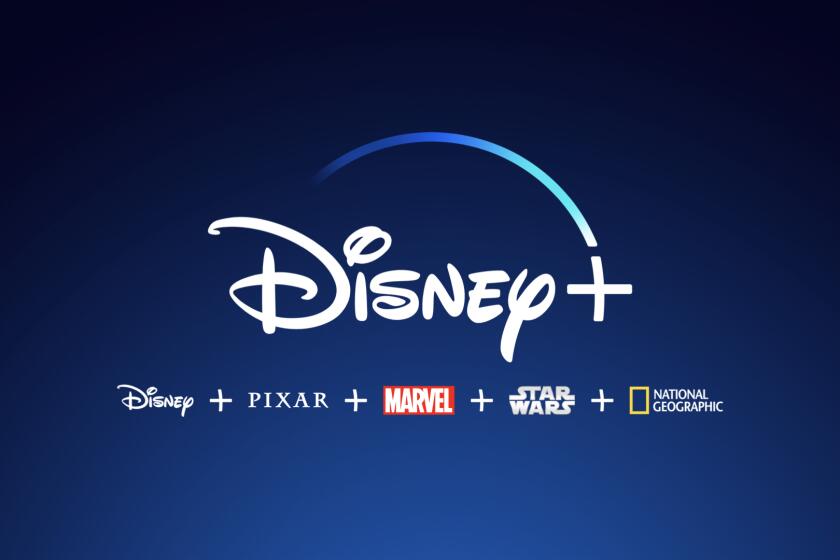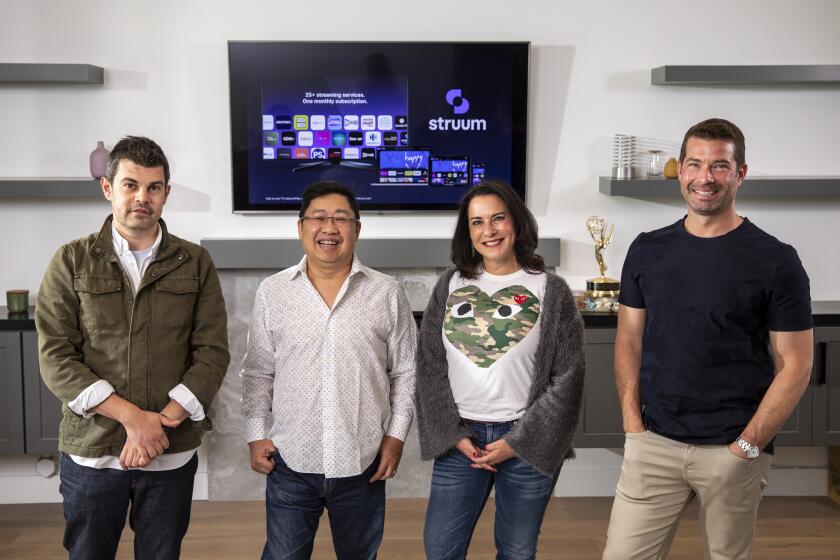My eyeballs are tired of being fought over, thanks
- Share via
When I am forced to consider the situation commonly known as “the streaming wars,” all I can think of, ironically enough, is “The Birds.”
One minute there’s a seagull or two swooping around, and the next thing you know a thousand crows are jostling for a prime spot on the school jungle gym.
And they’ve all come for your eyeballs.
It’s always the eyeballs. “More than 300 services — including subscription, advertising-based and transactional video-on-demand platforms — are competing for eyeballs in the U.S.” my colleague Ryan Faughnder recently wrote in a succinct and informative look at the potential fallout from AT&T’s WarnerMedia merger with Discovery.
I don’t blame Ryan for reducing us to our optic organs (though we do have hearts and minds as well, Ryan!); television has been in the eyeball business since its inception. It’s just that my eyeballs are super-tired. Instead of feeling the natural power and the thrill of desirability, they feel more like Malcolm McDowell’s orbs in “A Clockwork Orange”: isolated and trapped.
As a matter of fact, my eyeballs are considering taking themselves off the market entirely. They’re sick of being courted, coaxed and, frankly, pressured into choosing this streaming service over that one, trying to keep up with all the glitzy platforms while not ignoring the quieter but equally worthy requests coming from those who may not be able to afford the lavish campaigns.
If WarnerMedia can’t compete on its own, what does that say for the other players? Do NBCUniversal and ViacomCBS get together?
And choosing a service is just the first bloody step.
Considering my profession, it is perhaps not surprising that I subscribe to many streamers, and the choices on each have become so overwhelming, so overly packaged — “trending,” “for you,” “because you once watched a movie starring Judi Dench” — that I recently dusted off my DVD player simply to avoid the anxiety of all that competition. (Also I do not appreciate being told that movies of my youth have been dragged “From the Vault.”)
Untouched by the vagaries of contracts, my DVDs will not be migrating from Netflix to HBOMax or suddenly changing their Amazon Prime status from free to rental. For all their storage issues, they are mine for eternity (or until they wear out).
OK, I’m not quite ready to go back to the dark ages, or 2010. I love streamers for all the obvious reasons, including that they allowed me to survive the lockdown and destigmatized subtitles.
I cannot profess to have any brand loyalty (though I do feel we are not talking about Peacock enough, which, among many other things, has all the Bournes). I have few bones to pick with any of the streamers — until people start talking about who’s going to get the most eyeballs. Netflix? Amazon? Hulu? Apple TV+? The new HBOMax/Discovery+ combo? (Do a “max” and a “+” mathematically cancel each other out?) Will there be bundles, as with cable TV? There are already commercials on lower cost streamers, and many have begun offering series in weekly installments ,which makes it feel very much like broadcast television, eyeballs-wise.
A bigger problem may be that it isn’t just television that’s dancing for our orbitals 24/7. It’s everything. Including me. If you are reading this online, which I very much hope you are (and either purchasing a digital subscription or convincing a friend to do so), I too am participating in the game.
Networks are accentuating the positive as they roll out their new businesses.
As are all the other news, social media and shopping platforms competing for your gaze. We measure where it focuses, how long it lingers, how often it moves where it goes when it rains.
Once upon a time the term “competing for eyeballs” was something of a metaphor. “Eyeballs” stood for viewers, yes, but also for attendees, subscribers and members. In other words for attention from people, actual people who turned on the television; went to movies, plays and museum exhibits; picked up and read newspapers, magazines and books. People who used many parts of the human body to engage in a wide variety of experiences.
Now, however, the term is much more literal. Through the miracle of digital technology, you can do just about everything using only your eyeballs (and whichever digits you use to type or scroll). The world unfolds right in front of your face. Same screen, different content.
It’s exhausting. Wonderful, miraculous, a boon during the pandemic, but utterly exhausting. In that mystifying “how can I be so tired when I have done nothing but sit for 10 hours” feeling of a trans-Atlantic flight or a really long conference.
Why are eyeballs doing all of the work all of the time? What happened to, say, the feet? How hard are the lungs working, really? Or the knees (they’re always complaining after all). Why is no multibillion-dollar industry competing for knees?

It would be easy to simply not care who survives the streaming wars and winds up with the biggest library and profit margin, but it does matter. For one thing, competition keeps the pricing down, and I don’t think it would be a good thing for a few corporations to control all our cinematic storytelling.
That was the problem in the first place. The emergence of new platforms for original content is what spawned the television revolution and all the wonders that came from it. A return to a Big Four of streaming could very well wind up with the same issues of exclusion, repetition and limited thinking that undid the Big Four of broadcasting.
With hundreds of streaming services out there, consumers face a daunting and expensive market when it comes to finding what to watch and where to watch it. L.A.-based app Struum says it has a solution.
And a multitude of platforms offers some form of organization. You know, at least generally, what you’re going to get on, say, BritBox , HBOMax or even Peacock.
Faughnder also recently reported on a new app that will aggregate from certain streamers, but as they are services most of us have never heard of (sorry, Cheddar, Indieflix, Filmbox, Cinedigm et al.), this seems to be adding to the problem rather than solving it.
Even in an unbundled world, there is one way to give our eyeballs a little agency in the process. It would be nice if someone could develop an app that could at least locate the content we’re actively looking for.
As I recently learned, to my chagrin, Amazon will lead you to believe the only way you can see a Bourne movie is by renting it even though the whole series is available on HBOMax. I don’t know whether anyone at Amazon has seen “Miracle on 34th Street” lately (like “The Birds,” it is available to rent on Prime Video and God knows where else), but when Macy’s and Gimbel’s started cross-referencing, it led to stronger brand loyalty, increased sales and official approval from Santa.
Or better yet, perhaps we should give our eyeballs a rest — at least from our personal screens. There is a wide world out there, and once again many of us are able to inhabit it safely as the pandemic ebbs and restrictions lift. Movies, theaters and museums, which love us for more than our eyeballs, are opening once again, as are restaurants, cafes, sports arenas, gyms and all the marvelous venues that require the use of muscles outside our orbital cavities.
I would add you could also pick up a newspaper or magazine, but as I have been told repeatedly, that ship has sailed. So when you’re out and about, think of me; remind your eyeballs that I have loved them well and long and am ready for a long-term commitment if they are.
After more than a year, my husband and I have a movie date (“Together Together”) and it was very weird and extremely wonderful.
More to Read
The biggest entertainment stories
Get our big stories about Hollywood, film, television, music, arts, culture and more right in your inbox as soon as they publish.
You may occasionally receive promotional content from the Los Angeles Times.














